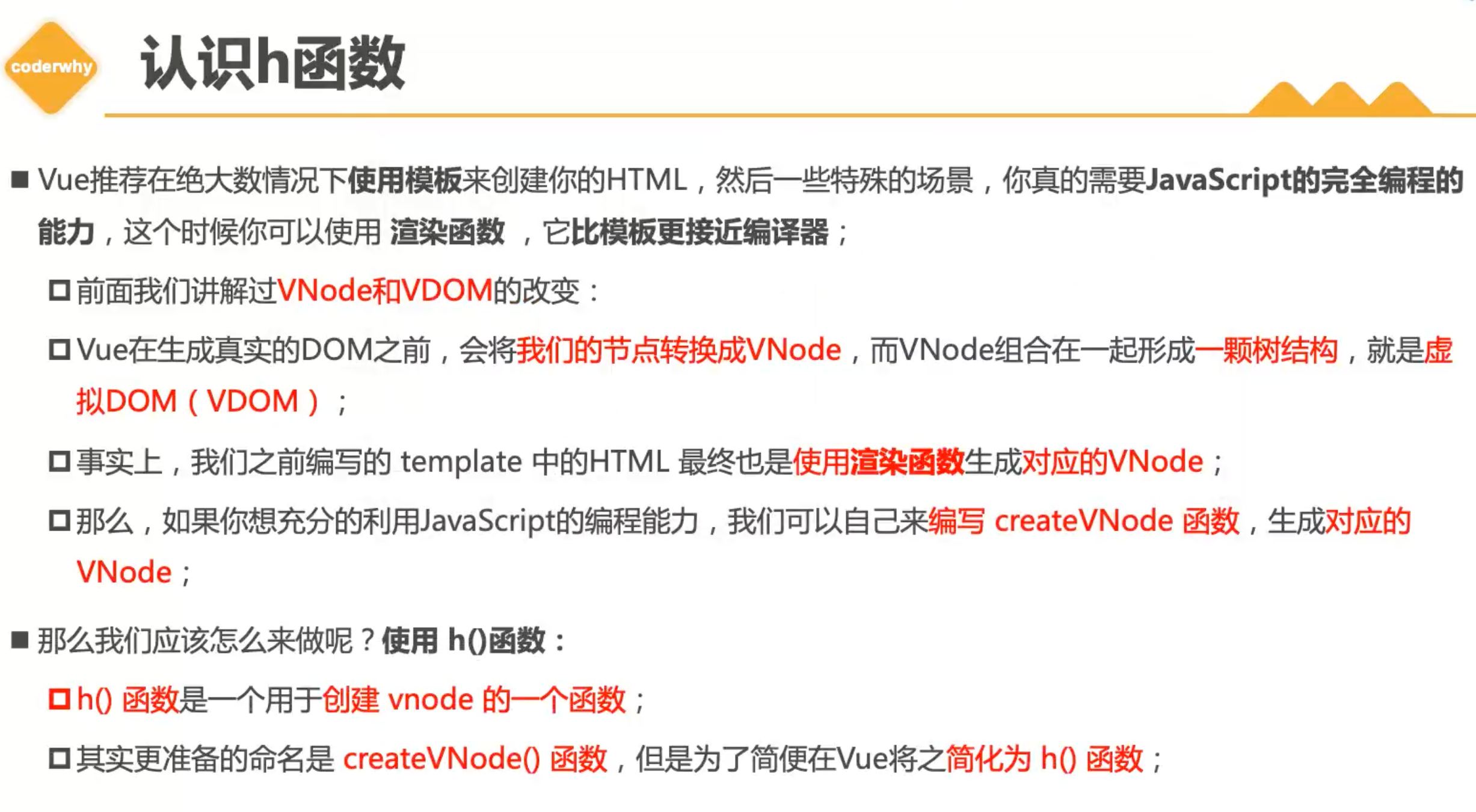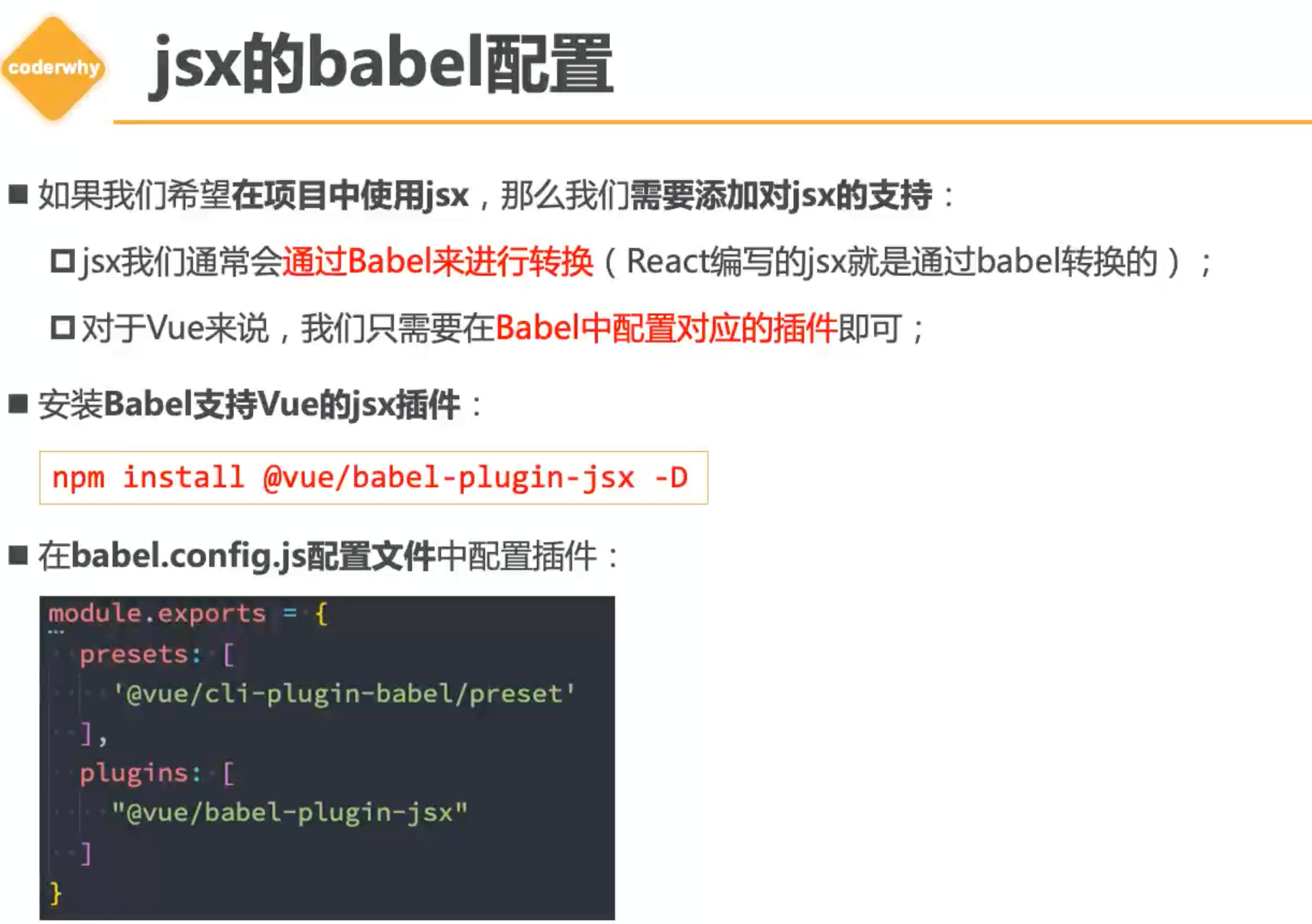#tag
Vue3-render函数的笔记

render的基本使用
|
<script>
import { h } from 'vue'
export default {
render() {
return h('h2', {class: 'title'} ,'hello render')
}
}
</script>
|
1
2
3
4
5
6
7
8
9
10
11
12
13
14
15
16
17
| <script>
import { h } from 'vue'
export default {
data() {
return {
counter: 0
}
},
render() {
return h('div', {class: 'title'}, [
h('h2', null, this.counter),
h('button', { onClick: () => this.counter++ }, '+'),
h('button', { onClick: () => this.counter-- }, '-')
])
}
}
</script>
|
1
2
3
4
5
6
7
8
9
10
11
12
13
14
15
16
| import { ref, h } from 'vue'
export default {
setup() {
const counter = ref(0)
return {
counter
}
},
render() {
return h('div', {class: 'title'}, [
h('h2', null, this.counter),
h('button', { onClick: () => this.counter++ }, '+'),
h('button', { onClick: () => this.counter-- }, '-')
])
}
}
|
1
2
3
4
5
6
7
8
9
10
11
12
13
| import { ref, h } from 'vue'
export default {
setup() {
const counter = ref(0)
return () => {
return h('div', {class: 'title'}, [
h('h2', null, counter.value),
h('button', { onClick: () => counter.value++ }, '+'),
h('button', { onClick: () => counter.value-- }, '-')
])
}
},
}
|
props与slot
1
2
3
4
5
6
7
8
9
10
11
12
13
14
| <script>
import { h, ref } from 'vue'
import Son from './04renderSlotS'
export default {
setup() {
const count = ref('by Father')
return () => {
return h(Son, { msg: count }, {
default: (props) => `default slot, get val: ${props}`,
})
}
}
}
</script>
|
1
2
3
4
5
6
7
8
9
10
11
12
13
14
15
16
17
18
19
20
21
22
| <script>
import { h} from 'vue'
export default {
props: {
msg: {
type: String,
default: 'hello'
}
},
setup(props, {slots}) {
console.log(props);
return () => {
return h('div', null, [
h('h2', null, `play render solt, get msg: ${props.msg.value}`),
slots.default ? slots.default('from son') : '没有插槽'
])
}
}
}
</script>
|
JSX

原理:jsx->babel->h()
因为h()的可读性太差了。
1
2
3
4
5
6
7
8
9
10
11
12
13
14
15
16
17
18
19
20
21
22
23
24
25
26
27
28
29
30
31
32
33
34
35
36
37
38
39
40
41
42
43
44
45
46
| <script>
import JsxSon from './05jsxSon.vue'
import { ref } from 'vue'
export default {
setup() {
const className = 'title'
const counter = ref(0)
return {
className,
counter,
}
},
render() {
const increment = () => {
this.counter++
}
const decrement = () => {
this.counter--
}
return (
<div>
<h2 class={this.className}>hello jsx</h2>
<p>counter: {this.counter}</p>
<button onClick={increment}>+1</button>
<button onClick={decrement}>-1</button>
<JsxSon>
{
{
default: props => {
return <div>from jsx father</div>
}
}
}
</JsxSon>
</div>
)
}
}
</script>
<style scoped>
.title {
color: red;
}
</style>
|
1
2
3
4
5
6
7
8
9
10
11
12
13
14
15
16
17
18
19
20
21
22
| <script>
export default {
render() {
return (
<div class="son-area">
<p>jsx - son</p>
<div>{this.$slots.default ? this.$slots.default() : '默认值...'}</div>
</div>
)
}
}
</script>
<style scoped>
.son-area {
background-color: slateblue;
color: #fff;
padding: 10px 0;
margin: 10px 0;
}
</style>
|
jsx优势:任意使用JavaScript代码、对比template灵活性更高、一般封装组件库才用。



